Join us as we celebrate the 50th Anniversary of Earth Day (which coincides with our program’s 50th anniversary). Co-hosted by the Energy Futures Initiative, the event began with remarks by Former Energy Secretary Ernest Moniz followed by a panel discussion on the climate and health nexus. Experts discussed the impacts of climate change on human health, highlighting economic, security, and social equity issues.
We were joined by Axios climate change and energy reporter Amy Harder to moderate the panel discussion.
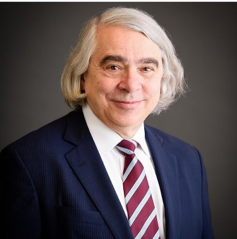 Keynote Speaker: Ernest J. Moniz served as the thirteenth United States Secretary of Energy from 2013 to January 2017. As Secretary, he advanced energy technology innovation, nuclear security and strategic stability, cutting-edge capabilities for the American scientific research community, and environmental stewardship. He placed energy science and technology innovation at the center of the global response to climate change and negotiated the Iran nuclear agreement alongside the Secretary of State. Dr. Moniz joined the Massachusetts Institute of Technology faculty in 1973 and was Founding Director of the MIT Energy Initiative. He is the Cecil and Ida Green Professor of Physics and Engineering Systems emeritus and Special Advisor to the MIT President. He served on Boards of numerous companies, non-profits and government agencies in the energy and security arenas.
Keynote Speaker: Ernest J. Moniz served as the thirteenth United States Secretary of Energy from 2013 to January 2017. As Secretary, he advanced energy technology innovation, nuclear security and strategic stability, cutting-edge capabilities for the American scientific research community, and environmental stewardship. He placed energy science and technology innovation at the center of the global response to climate change and negotiated the Iran nuclear agreement alongside the Secretary of State. Dr. Moniz joined the Massachusetts Institute of Technology faculty in 1973 and was Founding Director of the MIT Energy Initiative. He is the Cecil and Ida Green Professor of Physics and Engineering Systems emeritus and Special Advisor to the MIT President. He served on Boards of numerous companies, non-profits and government agencies in the energy and security arenas.
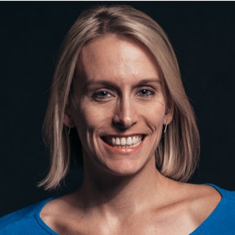 Moderator: Amy Harder has covered events including congressional legislation, regulations, lobbying, and international policy actions affecting the United States. Previously, she covered the same issues for The Wall Street Journal, based out of its Washington, DC, bureau. Harder is regularly sought out to speak and participate in energy events, including moderating and participating in panel discussions and giving speeches in Washington and throughout the country. Earlier in her career, Harder covered energy and other issues for National Journal.
Moderator: Amy Harder has covered events including congressional legislation, regulations, lobbying, and international policy actions affecting the United States. Previously, she covered the same issues for The Wall Street Journal, based out of its Washington, DC, bureau. Harder is regularly sought out to speak and participate in energy events, including moderating and participating in panel discussions and giving speeches in Washington and throughout the country. Earlier in her career, Harder covered energy and other issues for National Journal.
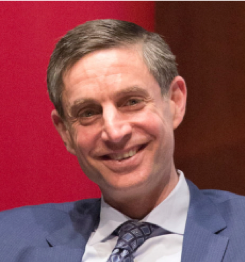 Panelists: Michael Greenstone, Director, Energy Policy Institute of Chicago; Michael Greenstone is the Milton Friedman Distinguished Service Professor in Economics, the College and the Harris School, as well as the Director of the Becker Friedman Institute and the interdisciplinary Energy Policy Institute at the University of Chicago. He previously served as the Chief Economist for President Obama’s Council of Economic Advisers, where he co-led the development of the United States Government’s social cost of carbon. Greenstone also directed The Hamilton Project, which studies policies to promote economic growth, and has since joined its Advisory Council. Greenstone’s research, which has influenced policy globally, is largely focused on uncovering the benefits and costs of environmental quality and society’s energy choices. His current work is particularly focused on testing innovative ways to increase energy access and improve the efficiency of environmental regulations around the world. Additionally, he is producing empirically grounded estimates of the local and global impacts of climate change as a co-director of the Climate Impact Lab. He also created the Air Quality Life Index that provides a measure of the gain in life expectancy communities would experience if their particulates air pollution concentrations are brought into compliance with global or national standards.
Panelists: Michael Greenstone, Director, Energy Policy Institute of Chicago; Michael Greenstone is the Milton Friedman Distinguished Service Professor in Economics, the College and the Harris School, as well as the Director of the Becker Friedman Institute and the interdisciplinary Energy Policy Institute at the University of Chicago. He previously served as the Chief Economist for President Obama’s Council of Economic Advisers, where he co-led the development of the United States Government’s social cost of carbon. Greenstone also directed The Hamilton Project, which studies policies to promote economic growth, and has since joined its Advisory Council. Greenstone’s research, which has influenced policy globally, is largely focused on uncovering the benefits and costs of environmental quality and society’s energy choices. His current work is particularly focused on testing innovative ways to increase energy access and improve the efficiency of environmental regulations around the world. Additionally, he is producing empirically grounded estimates of the local and global impacts of climate change as a co-director of the Climate Impact Lab. He also created the Air Quality Life Index that provides a measure of the gain in life expectancy communities would experience if their particulates air pollution concentrations are brought into compliance with global or national standards.
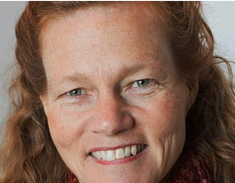 Amy Luers, Executive Director, Future Earth; Director, Center for Sustainability in the Digital Age. Amy has over 20 years of experience working at the intersection of science, technology and policy. A former assistant director in the Obama White House and senior manager at Google, she is a member of the U.S. Council on Foreign Relations and has served on committees of the U.S. Global Change Research Program and the National Academies of Sciences. Dr. Luers spent a number of years directing the water and climate security work at the Skoll Global Threats Fund. She sits on several advisory boards including the Carnegie Climate Governance Initiative, the International Observatory of AI and Digital Technologies, the US National Council for Science and the Environment, and Stanford University’s School of Earth. Luers has a PhD in environmental science, and a MA in international policy studies from Stanford University.
Amy Luers, Executive Director, Future Earth; Director, Center for Sustainability in the Digital Age. Amy has over 20 years of experience working at the intersection of science, technology and policy. A former assistant director in the Obama White House and senior manager at Google, she is a member of the U.S. Council on Foreign Relations and has served on committees of the U.S. Global Change Research Program and the National Academies of Sciences. Dr. Luers spent a number of years directing the water and climate security work at the Skoll Global Threats Fund. She sits on several advisory boards including the Carnegie Climate Governance Initiative, the International Observatory of AI and Digital Technologies, the US National Council for Science and the Environment, and Stanford University’s School of Earth. Luers has a PhD in environmental science, and a MA in international policy studies from Stanford University.
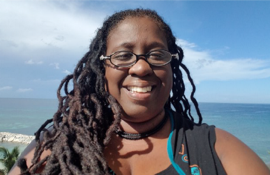 Jacqui Patterson, Senior Director Environmental and Climate Justice Program NAACP. Jacqueline Patterson is the Director of the NAACP Environmental and Climate Justice Program. Since 2007 Patterson has served as coordinator & co-founder of Women of Color United. Jacqui Patterson has worked as a researcher, program manager, coordinator, advocate and activist working on women‘s rights, violence against women, HIV&AIDS, racial justice, economic justice, and environmental and climate justice. Patterson served as a Senior Women’s Rights Policy Analyst for ActionAid where she integrated a women’s rights lens for the issues of food rights, macroeconomics, and climate change as well as the intersection of violence against women and HIV&AIDS. Previously, she served as Assistant Vice-President of HIV/AIDS Programs for IMA World Health providing management and technical assistance to medical facilities and programs in 23 countries in Africa and the Caribbean. Patterson served as the Outreach Project Associate for the Center on Budget and Policy Priorities, and Research Coordinator for Johns Hopkins University. She also served as a U.S. Peace Corps Volunteer in Jamaica, West Indies.
Jacqui Patterson, Senior Director Environmental and Climate Justice Program NAACP. Jacqueline Patterson is the Director of the NAACP Environmental and Climate Justice Program. Since 2007 Patterson has served as coordinator & co-founder of Women of Color United. Jacqui Patterson has worked as a researcher, program manager, coordinator, advocate and activist working on women‘s rights, violence against women, HIV&AIDS, racial justice, economic justice, and environmental and climate justice. Patterson served as a Senior Women’s Rights Policy Analyst for ActionAid where she integrated a women’s rights lens for the issues of food rights, macroeconomics, and climate change as well as the intersection of violence against women and HIV&AIDS. Previously, she served as Assistant Vice-President of HIV/AIDS Programs for IMA World Health providing management and technical assistance to medical facilities and programs in 23 countries in Africa and the Caribbean. Patterson served as the Outreach Project Associate for the Center on Budget and Policy Priorities, and Research Coordinator for Johns Hopkins University. She also served as a U.S. Peace Corps Volunteer in Jamaica, West Indies.

